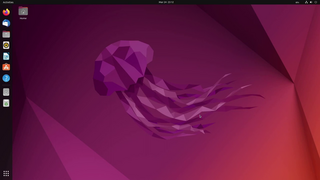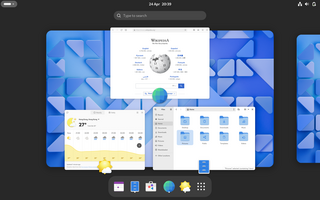
Jonathan Edward James Bacon is a writer and software engineer, originally from the United Kingdom, but now based in California. He works as a consultant on community strategy.

Ubuntu is a Linux distribution based on Debian and composed mostly of free and open-source software. Ubuntu is officially released in multiple editions: Desktop, Server, and Core for Internet of things devices and robots. The operating system is developed by the British company Canonical, and a community of other developers, under a meritocratic governance model. As of October 2023, the most-recent release is 23.10, and the current long-term support release is 22.04.

Canonical Ltd. is a UK-based privately held computer software company founded and funded by South African entrepreneur Mark Shuttleworth to market commercial support and related services for Ubuntu and related projects. Canonical employs staff in more than 70 countries and maintains offices in London, Austin, Boston, Shanghai, Beijing, Taipei, Tokyo and the Isle of Man.

Kubuntu is an official flavor of the Ubuntu operating system that uses the KDE Plasma Desktop instead of the GNOME desktop environment. As part of the Ubuntu project, Kubuntu uses the same underlying systems. Kubuntu shares the same repositories as Ubuntu and is released regularly on the same schedule as Ubuntu.

Xubuntu is a Canonical Ltd.–recognized, community-maintained derivative of the Ubuntu operating system. The name Xubuntu is a portmanteau of Xfce and Ubuntu, as it uses the Xfce desktop environment, instead of Ubuntu's customized GNOME desktop.

Compiz is a compositing window manager for the X Window System, using 3D graphics hardware to create fast compositing desktop effects for window management. Effects, such as a minimization animation or a cube workspace, are implemented as loadable plugins. Because it conforms to the ICCCM conventions, Compiz can be used as a substitute for the default Mutter or Metacity, when using GNOME Panel, or KWin in KDE Plasma Workspaces. Internally Compiz uses the OpenGL library as the interface to the graphics hardware.

Stuart Langridge is a podcaster, developer and author. He became a member of the Web Standards Project's DOM Scripting Task Force, an invited expert on the W3C HTML Working Group and is an acknowledged commentator on W3C Document Object Model and JavaScript techniques.

LugRadio was a British podcast on the topic of Linux and events in the free and open source software communities, as well as coverage of technology, digital rights and politics.

Ubuntu releases are made semiannually by Canonical Ltd, its developers, using the year and month of the release as a version number. The first Ubuntu release, for example, was Ubuntu 4.10 and was released on 20 October 2004. Consequently, version numbers for future versions are provisional; if the release is delayed until a different month to that planned, the version number will change accordingly.

GNOME, originally an acronym for GNU Network Object Model Environment, is a free and open-source desktop environment for Linux and other Unix-like operating systems.

Unity is a graphical shell for the GNOME desktop environment originally developed by Canonical Ltd. for its Ubuntu operating system. It debuted in 2010 in the netbook edition of Ubuntu 10.10. Since 2017, its development was taken over by the Unity7 Maintainers (Unity7) and UBports.

Ubuntu Unity is a Linux distribution based on Ubuntu, using the Unity interface in place of Ubuntu's GNOME Shell. The first release was 20.04 LTS on 7 May 2020. Prior to the initial release it had the working names of Unubuntu and Ubuntu Unity Remix.

MATE is a desktop environment composed of free and open-source software that runs on Linux, and other Unix-like operating systems such as BSD, and illumos operating systems.

Cinnamon is a free and open-source desktop environment for Linux and other Unix-like operating systems, which was originally based from GNOME 3 but follows traditional desktop metaphor conventions.
System76, Inc. is an American computer manufacturer based in Denver, Colorado, specializing in the sale of notebooks, desktops, and servers. The company utilizes free and open-source software, and offers a choice of Ubuntu or their own Ubuntu-based Linux distribution Pop!_OS as preinstalled operating systems.
Mir is a computer display server and, recently, a Wayland compositor for the Linux operating system that is under development by Canonical Ltd. It was planned to replace the currently used X Window System for Ubuntu; however, the plan changed and Mutter was adopted as part of GNOME Shell.

Ubuntu MATE is a free and open-source Linux distribution and an official derivative of Ubuntu. Its main differentiation from Ubuntu is that it uses the MATE desktop environment as its default user interface, instead of the GNOME 3 desktop environment that is the default user interface for Ubuntu.

Snap is a software packaging and deployment system developed by Canonical for operating systems that use the Linux kernel and the systemd init system. The packages, called snaps, and the tool for using them, snapd, work across a range of Linux distributions and allow upstream software developers to distribute their applications directly to users. Snaps are self-contained applications running in a sandbox with mediated access to the host system. Snap was originally released for cloud applications but was later ported to also work for Internet of Things devices and desktop applications.

KDE neon is a Linux distribution developed by KDE based on Ubuntu long-term support (LTS) releases, bundled with a set of additional software repositories containing the latest versions of the Plasma 5 desktop environment/framework, Qt 5 toolkit and other compatible KDE software. First announced in June 2016 by Kubuntu founder Jonathan Riddell following his departure from Canonical Ltd., it has been adopted by a steadily growing number of Linux users, regularly appearing in the Top 20 on DistroWatch.com's popularity tables.

UKUI is a desktop environment for Linux distributions and other UNIX-like operating systems, originally developed for Ubuntu Kylin, and written using the Qt framework. UKUI is a fork of the MATE Desktop Environment.

















